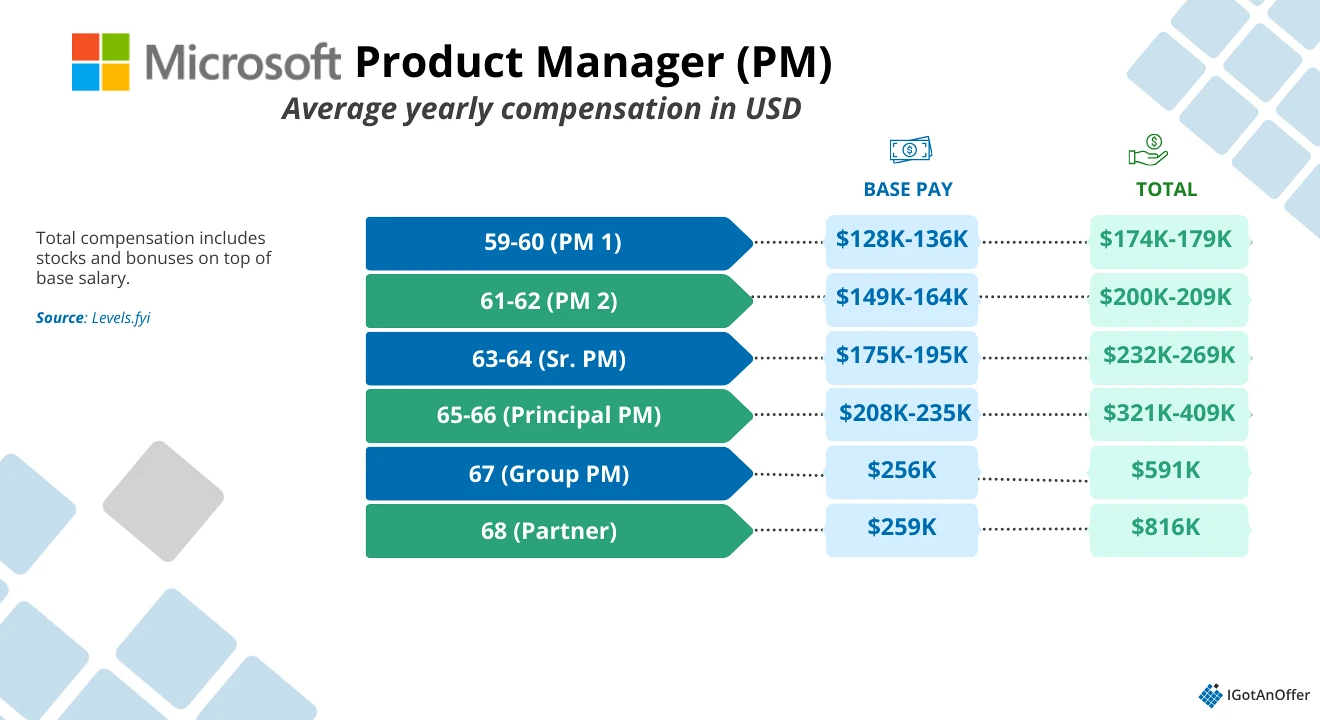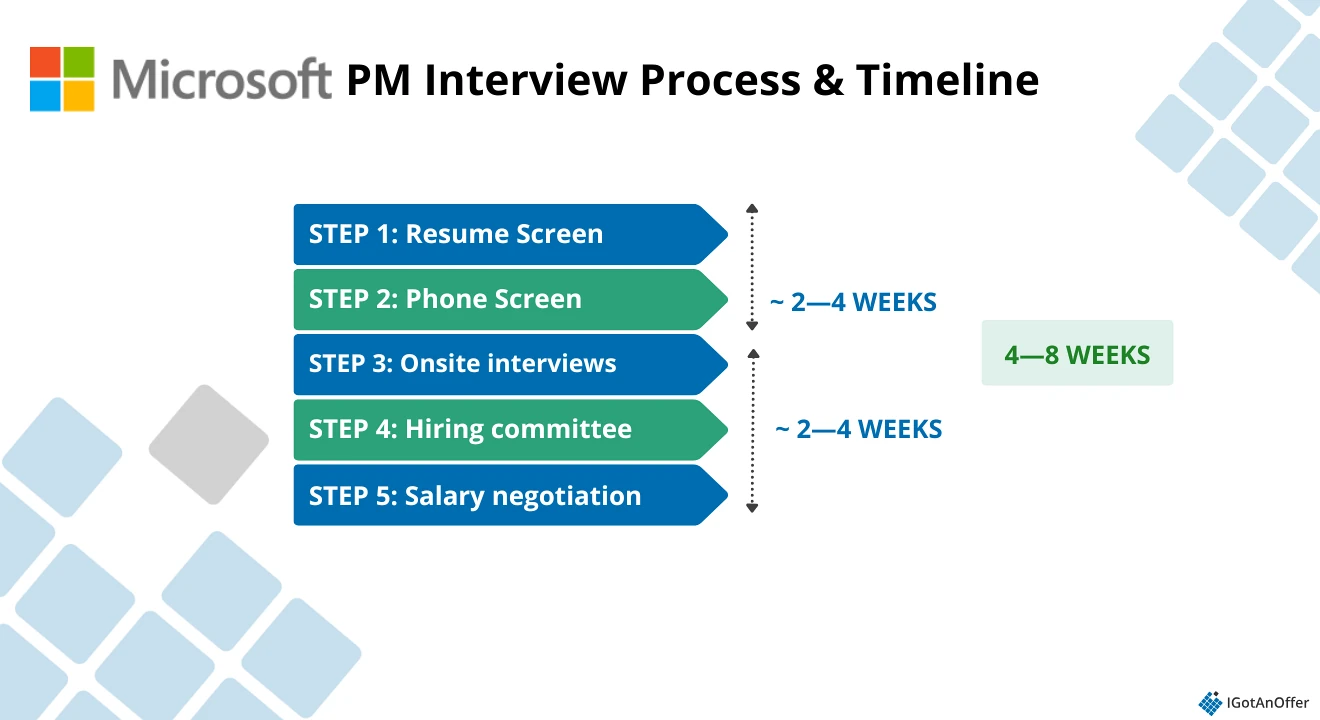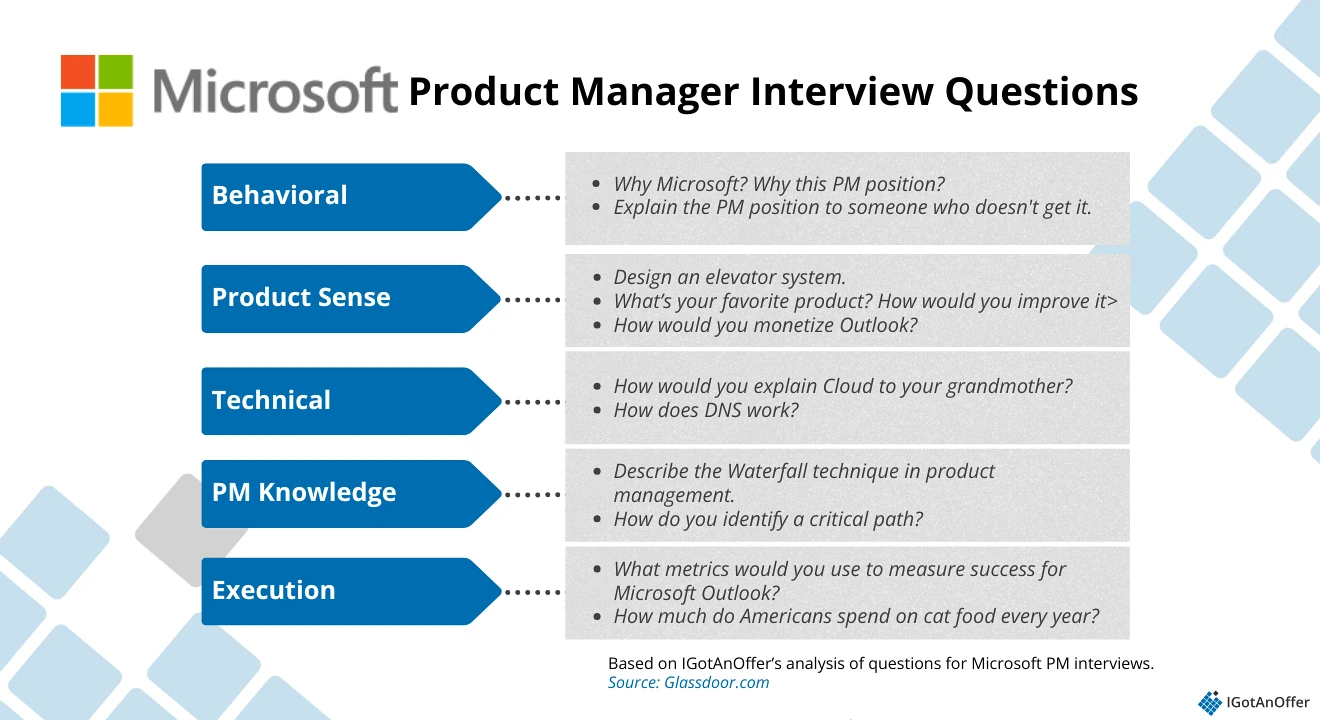Microsoft product manager interviews are difficult. With an acceptance rate at Microsoft estimated to be around 1% to 2%, you’ll have to stand out from the pack in order to receive an offer.
That’s where we come in. We’ve collected and categorized 277 Microsoft PM interview questions from Glassdoor and listed here the most common questions asked as example questions for each category.
We’ve also added a step-by-step preparation plan to help you maximize your chances of success.
- Role and salary
- Interview process and timeline
- Example interview questions
- Interview tips
- Preparation plan
Click here to practice with Microsoft ex-interviewers
1. Microsoft Product Manager Role and Salary↑
Before we cover your product manager interviews at Microsoft, let's take a quick look at the PM role itself.
Product managers at Microsoft are responsible for identifying product opportunities, defining product problems, and driving product solutions across Microsoft’s ecosystem.
They play an active role in developing various software-as-a-service (SaaS) products for Microsoft’s different users and markets. They provide guidance and support in all things that involve Microsoft’s products.
Microsoft product managers’ responsibilities can be categorized into four:
- Market research
- Product road-mapping
- Management
- Post-development
They oversee the product creation, development, and post-development processes and work closely and collaboratively with different stakeholders, such as product designers and engineers. They also oversee the people and teams involved in the different processes.
Given so many Microsoft products, a product manager may be assigned to several related products or to only one product for a given time period.
According to Michael, a former Microsoft product manager, “The PM role at Microsoft is a blend of a Product Manager and a Technical Program Manager, involving a variety of tasks from strategizing product direction to handling technical issues. The balance of responsibilities varies depending on the team and product.”
What skills are required to be a Microsoft product manager?
To be a successful product manager at Microsoft, you need a combination of product management, market research, communication, collaboration, documentation, and role-related technical skills.
We’ve examined several Microsoft job posts for different product manager roles, and they emphasize these skills over and over.
You’ll need a bachelor’s or master’s degree in a relevant field such as business administration, marketing, or computer science. You’ll also need to have at least one year of product management experience, either as an intern within a Microsoft product team or as a junior product manager at a startup, although most job offers require 3+ years.
You'll need to demonstrate that you are strategic and analytical, with a strong user-centric focus, good market awareness, interpersonal relations skills, communication skills, problem-solving skills, and leadership skills.
You’ll also need to show that you’re adept at cross-functional collaboration, as Microsoft product managers are expected to work with technical and non-technical teams alike across their ecosystem.
1.2 How much does a Microsoft product manager make?
According to Glassdoor, a Microsoft product manager earns 37% more than the average PM in the US.
Total compensation includes additional pay, which averages at around $50K a year and can include cash bonuses and stocks.
Here are the average total annual compensations for Microsoft product manager levels:

Aside from levels, the number of years of experience and location influence salary differences.
Ultimately, how you do in your interviews will help determine what you’ll be offered. Remember, compensation packages are always negotiable, even at Microsoft.
So, if you do get an offer, don’t be afraid to ask for more. If you need help negotiating, consider booking one of our salary negotiation coaches to get expert advice. You can also prepare for it yourself by reading our PM salary negotiation guide.
2. Microsoft Product Manager Interview Process and Timeline ↑

What's the Microsoft PM interview process and timeline? On average, it takes four to eight weeks to get an offer, but it can sometimes take longer.
The Microsoft PM interview steps:
- Resume, cover letter, and referrals
- Phone screen (one interview)
- On-site (four to five interviews)
- Hiring committee review
- You get an offer!
Note: If you are interviewing for a product leadership position (VP, Director, Group PM), learn more about the process and how to prepare from this product leader interview prep guide.
2.1 What steps to expect
First, it's important that you understand the different stages of your interview process with Microsoft. Here is what you can expect:
- Resume and cover letter screening / employee referral
- Phone screen: one interview
- On-site: four to five interviews
2.1.1 Resume and cover letter screening
First, recruiters will look at your resume and assess if your experience matches the open position. This is the most competitive step in the process, as hundreds of thousands of candidates do not make it past this stage.
You can use this free product manager resume guide to help tailor your resume to the position you’re targeting.
And if you’re looking for expert feedback, you can also get input from our team of ex-FAANG recruiters, who will cover what achievements to focus on (or ignore), how to fine-tune your bullet points, and more.
2.1.2 Phone screen
Next, the Microsoft interview process starts with an HR recruiter call. The objective of this conversation is to understand more about your background and to confirm that you've got a chance of getting the job at all.
You can expect behavioral questions such as, "Tell me about yourself," "Why Microsoft?" or, "Tell me about a product or feature you launched from start to finish." And you should also be prepared for a couple of questions around general product thinking like, “What’s your favorite Microsoft product and how would you improve it? ”
2.1.3 On-site
If you get past this HR screen, the recruiter will then organize on-site interviews. You'll typically spend a full day at one of Microsoft’s offices and participate in four to five interviews.
Each interview will last about 45 to 60 minutes and be a one-on-one with a mix of other folks from the PM team. In most cases, you will be interviewed by your future PM peers, a senior PM, and a senior executive who is likely the hiring manager leading your recruitment.
You can expect a lot of behavioral and product sense questions (more on this in Section 3), but, as confirmed by Shiva (ex-Microsoft PM), there will be plenty of technical, design, strategy, estimation, analysis, and prioritization questions as well. If you're interviewing for an AI-focused PM role, expect some questions to involve topics relevant to AI/ML.
Unlike Google/Meta interviews, Microsoft interviews are less clearly defined. They could start with one type of question and go on a tangent to ask another type of question related to it.
For example, even if the interview starts with behavioral or product sense questions, you could receive follow-up questions that test your technical knowledge.
We'll explain more about these different types of questions in Section 3.
2.2 What happens behind the scenes?
Your recruiter is leading the process and taking you from one stage to the next. Here's what happens at each of the stages described above:
- After the phone screen, your recruiter decides to move you to the on-site interviews or not, depending on how well you've done in relation to the criteria provided to them by the hiring manager.
- During the on-site, interviewers will make recommendation notes to hire you or not, and each interviewer will be able to see all the notes from previous interviews.
- If recommended by the majority, at the end of the day you’ll be invited to what Microsoft commonly calls the “as appropriate” interview (given it is only scheduled if you have enough positive recommendations at that point). This interview is an opportunity to ask intelligent questions about the organization and show off your passion for Microsoft, the department, and the industry.
- If the majority of all interviewers recommend you, the hiring team will make you an offer, usually within a week.
It's also important to note that recruiters and people who refer you have little influence on the overall process. They can help you get an interview at the beginning, but that's about it.
The good news is that cracking PM interviews is actually really manageable once you know how to prepare.
Now, let's take a look at the different types of questions Microsoft will ask you.
3. Microsoft Product Manager Example Interview Questions ↑
The main difficulty with PM interviews at Microsoft is that you will be asked a wide range of questions.
We've grouped them into five buckets and analyzed how frequently they were asked by Microsoft interviewers using questions reported by former candidates on Glassdoor.

Here are the results of our analysis:
- Behavioral, 52%
- Product questions (design, improvement, strategy), 26%
- Technical, 10%
- PM knowledge, 7%
- Execution (estimation, prioritization), 3+3=6%
Let's step through each type of question, discuss why Microsoft asks these questions, and take a look at a few examples in each category.
3.1 Behavioral questions (52%) ↑
As in most interview processes, you'll need to answer behavioral interview questions. Microsoft places a heavy emphasis on this area, and the questions asked tend to fall into three categories:
- Your motivation to work at Microsoft and as a PM
- Your past experiences
- Your understanding of product management
According to Astika, a former Microsoft product manager, a running thread through all these categories is this focus: “Can you empathize with your team members? What is your leadership style? Are you a team player? ” Microsoft interviewers ask these behavioral questions to find out how good you are at working with a team.
These questions aren't particularly hard compared to some of the others listed in this guide and are sometimes overlooked by candidates. It's worth spending time to prepare answers for them, though, to build an edge against other applicants, especially since they comprise half of all questions reported by candidates at Glassdoor.
Example behavioral questions asked by Microsoft
- Tell me about yourself.
- Why Microsoft? (sample answer from Amazon interviews)
- Why do you want to do product management?
- Why do you want this job, and what can you bring that we don't already have?
- Explain the PM position to someone who doesn't get it.
- Tell me about a time when you had to work through a problem with a teammate.
- Tell me about a time when you faced conflict within a team and how you dealt with it.
- Tell me about a product you led from idea to launch.
- Tell me about the most challenging product you’ve worked on.
- Tell me about a time you failed.
- Tell me about big-budget projects you’ve worked on. How do you ensure that you work within budget?
- What’s the biggest risk you’ve taken in managing a project?
- How do you know what your customers want?
- How do you get people to agree with your point of view?
- How can a product manager influence without being authoritative?
- If you want to get something built, how will you influence the developers to build it and the senior leadership to agree with this idea?
- In working with teams, what is an achievement that you are most proud of?
- How do you manage a project where you need to scale up and then scale down frequently?
- How do you keep track of multiple tasks?
For more information, check out our article on how to answer behavioral interview questions, which focuses primarily on Meta behavioral questions but can be applied to any company.
If you need more practice, check out our guide on PM behavioral interview questions, which includes sample answers to the top 8 most commonly asked.
You can also watch this mock interview on how ex-FAANG interviewers answer seven common product manager behavioral questions.
3.2 Product questions: design, improvement, strategy (26%) ↑
Product questions will make up a significant part of your interviews, with questions covering product design, product improvement, and product strategy. Let’s dive into each one.
3.2.1 Product design
A core task for PMs is to help design new product features and improve existing ones. It's therefore not surprising that design questions are a part of Microsoft PM interviews.
Astika says that Microsoft wants to test your user-centricity when it comes to product design: “Can you empathize with the users? Can you brainstorm pain points for them? Can you prioritize solutions to solve their pain points? ”
You’ll also need to demonstrate the ability to think creatively within a structured approach to designing products.
Here are a few questions Microsoft has asked in recent years.
Example product design questions asked by Microsoft
- Design an elevator system.
- How would you design an alarm clock for the hard of hearing?
- How would you design a washing machine?
- Design a 3-button remote for a television.
- Design a vending machine to be located at an airport gate.
- Design a kitchen.
- Design a microwave oven for college students.
- Design a product for campus recruitment.
- Thinking of a product you’ve started using a lot lately and considering how to improve the user experience, draw out a new UI/UX.
- Design the UI/UX for Disney’s new streaming platform.
- Design the most engaging user interface for a music app that you can think of.
- How would you design a Microsoft cell phone?
- A new building owner wants an elevator to be constructed. What are some of the questions you will ask them or the factors you will consider before you give them the final recommendation?
- If you were to design an app for selling and buying antiques, how would you do it?
For more information, check out our guide on how to answer product design questions in PM interviews.
3.2.2 Product improvement
Product improvement questions are frequently asked during product manager interviews for interviewers to assess your ability to create a methodical thought process given uncertain situations and explain the product and the pain points it addresses for different user groups.
Product improvement questions also aim to assess how you are able to identify the problems with the product that users of different segments have, think of innovative ways to improve the product, evaluate your options and create a product roadmap with clear priorities.
Example product improvement questions asked by Microsoft
- What’s your favorite product, and how would you improve it?
- How would you improve a past project you worked on?
- Choose a popular product in the market. How would you improve it?
- What’s your favorite product, and why? How would you improve it?
- How would you improve a specific product line if the goal is to acquire new users?
- Choose a relevant app you use. What would you improve? Why?
- How would you add food ordering to Excel?
To learn more, check out our guides on how to answer product improvement questions and the favorite product question in PM interviews.
3.2.3 Product strategy
PMs are responsible for setting the product vision and roadmap to deliver it. In other words, they're in charge of product strategy.
In your interviews, you'll therefore be given strategic questions to discuss with your interviewer. These questions assess if you're comfortable thinking about the wide range of aspects good PMs need to take into account when making product decisions. This includes competition, pricing, marketing, time to market, etc.
Thinking through all these aspects requires creativity and a structured approach.
Example product strategy questions asked by Microsoft
- Imagine you’re a PM at a startup that works with big data. Now what?
- If you were a PM on Microsoft Surface and Delta asked you to design the perfect airline entertainment system, what would you do? Walk through your thoughts and pitch it.
- How would you monetize Outlook?
- Take any production chain; how can you optimize the production process?
- How would you motivate users to use your app every single day for a month?
- You are the king of an island. You want to switch which side of the road everyone is driving on. How do you go about doing it?
- How would you define a product strategy for a new AI-powered productivity tool?
- Choose a target customer to build an MLP (minimum loveable product) for. Brainstorm multiple features to add to this to scale the product over time.
- How would you assess whether or not to discontinue a product?
For more information, check out our article on how to answer product strategy interview questions.
3.3 Technical questions (10%) ↑
Microsoft expects a fair amount of technical knowledge from candidates. Microsoft PMs tend to be more technical than average, usually having a degree in computer science or significant previous experience with software and engineering.
Astika explains that Microsoft interviewers want to know if you have sufficient abilities in these: “Do you understand the basics of how tech works in software products? Can you speak the language of engineers?
As a consequence, you'll typically need to answer a few technical questions during your interview process.
As you can see below, these questions are not a test of coding expertise in any particular language. They are centered on whether or not you understand and can offer simple explanations of certain technical concepts—especially algorithms.
Example technical questions asked by Microsoft
- How would you explain Cloud to your grandmother?
- How would you explain recursion to somebody who is not technical?
- How does DNS work?
- What is the runtime of merge sort, and why?
- What is the difference between C++ and Java?
- Given a list with an unknown number of elements, how would you find and then remove the second-to-last element in the list?
- Explain the concept of big O notation.
- Design a method that removes every other node from a linked list.
- How does the internet work?
- Explain heap sort. What is time and space complexity?
- For a boggle game (4x4 matrix) with letters in each block, how would you think about an algorithm such that it can give a list of all the words (minimum 2 letters long) in the matrix? It has to be the adjacent letter and can be in any direction (left, right, up, down, diagonal).
For more information, check out our article on how to answer technical interview questions.
3.4 PM knowledge questions (7%) ↑
Product management (PM) knowledge questions are designed to assess your understanding of core product management principles, methodologies, and best practices. They are your ability to think strategically, solve problems, and make data-driven decisions.
Product managers play a pivotal role in a company's success by bridging the gap between technical teams and business objectives. These questions help interviewers evaluate your ability to be a good product manager.
These questions can involve product management approaches and techniques, product lifecycle management, market analysis, and problem-solving.
Example PM knowledge questions asked by Microsoft
- Describe the Waterfall technique in product management.
- How do you identify a critical path?
- What product KPIs have you used, and how did they help you in managing products?
- What are the key metrics to track at each stage of a product's lifecycle?
- How would you conduct a competitive analysis for a new cloud-based gaming service?
- Describe a time when you had to make a difficult decision based on incomplete data. How did you approach the situation?
To learn more or brush up on your product management knowledge, check out this guide on essential product management tools.
3.5 Execution questions: metric, estimation and prioritization (6%) ↑
Good PMs are critical thinkers and can make confident and swift decisions. Making these decisions often requires analytical, estimation, and prioritization skills, which Microsoft will test you on in the on-site interviews.
- Analysis or metric questions: These questions test how well you work with available data. A good PM can identify the correct KPIs for a product and use them to deliver results.
Astika says that Microsoft particularly emphasizes analytical or metric questions. “Can you set key metrics for a product? Can you discuss the trade-offs and pitfalls of your main metrics? Can you set a north star metric?
- Estimation questions: In estimation questions, interviewers don't care so much about whether you get to the right answer or not. What they are really interested in is how you think through the problem and how comfortable you are making assumptions and simple calculations.
- Prioritization questions: Microsoft interviewers also like to ask prioritization questions to assess your decision-making ability when making trade-offs. They want to see that you are capable of using frameworks in structuring your approach.
Example execution questions asked by Microsoft
Analysis or metric questions
- How would you track user engagement in an app, and what KPIs would you use to improve it?
- What metrics would you use to measure success for Microsoft Outlook?
- How would you set goals for a Microsoft product of your choice?
- For products like Windows, there are millions of customers; how do you test for all?
Estimation questions
- How much money do Americans spend on cat food every year?
- How would you go about estimating the number of gas stations in the USA?
- How would you weigh a plane without a scale, but other tools at your disposal?
- There are 24 holes in the key. How many combinations of passwords can you think of?
Prioritization questions
- Describe your product framework for prioritization.
- How do you prioritize work items?
- How would you prioritize features for a product with limited resources and a tight deadline?
For more information, check out our articles on how to answer metric questions, estimation questions, and prioritization questions in PM interviews.
4. Interview tips ↑
You might be a fantastic product manager, but unfortunately, that’s not necessarily enough to ace your interviews at Microsoft. Interviewing is a skill in itself that you need to learn.
Let’s look at some key tips to make sure you approach your interviews in the right way. Below, you’ll find links to free resources and twelve introductory steps to help you prepare for your Microsoft PM interviews.
4.1 Deep dive into the product / organization
As you've probably figured out from the example questions listed above, you can't become a PM at Microsoft without being familiar with the company's products and its organization. You'll therefore need to do some homework before your interviews.
Here are some resources to help you get started with this:
- Microsoft Vision and Mission (Microsoft)
- Microsoft Vision and Mission Analysis (Panmore Institute)
- Microsoft Strategy Teardown (CB Insights)
- Microsoft Interview Tips (Microsoft Careers)
- Microsoft Hiring Tips (Microsoft Careers)
- The Official Microsoft Blog (Microsoft)
- Microsoft Annual Reports (by Microsoft)
4.2 Learn a consistent method for answering PM interview questions
As mentioned previously, Microsoft will ask you questions that fall into certain categories like behavioral, design, strategy, estimation, and metric questions. Approaching each question with a predefined method will enable you to build strong interview habits.
Then, when it comes time for your interviews, these habits will reduce your stress and help you to make a great impression.
If you’re just looking for a jumping-off point, you can start learning about the different question types you’ll need to master in the following blog articles:
- Behavioral questions
- PM behavioral questions
- Product design questions
- Product improvement questions
- Favorite product question
- Strategy questions
- Metric questions
- Technical questions
- Estimation questions
- Prioritization questions
- AI PM interview questions
Once you understand how to answer each question type, you also need to be able to communicate your answers clearly under the pressure of interview conditions. That’s where practice comes into play.
4.3 Ask clarifying questions
Some of the questions you will be asked will be quite ambiguous. In those cases, you’ll need to ask clarifying questions to get more information about the problem and to reduce its scope.
Jumping straight in without asking questions first will be a red flag to the interviewer and will hinder your answer.
For instance, if you were asked, “What would be your 10-year strategy if you were CEO?” you can respond by asking some questions about the company’s current situation and any business objectives the interviewer may have in mind. This way, you’ll have a better understanding of what the company needs in the coming years and have more information from which to build a strategy.
4.4 Justify your choices
Microsoft wants to see the reasoning behind your answer, so make sure to justify each decision you make. You'll need to make plenty of trade-offs as you arrive at a solution, so be sure to call them out.
4.5 Be data-driven, but not too data-driven
Microsoft is looking for product managers who can make decisions based on data and can judge everything they do by relevant metrics.
In an interview situation, it's okay to make assumptions because you might not have access to the facts and data. But you need to make it clear that in real life, you would seek out that data and that your approach would be highly data-driven.
4.6 Demonstrate user empathy
Microsoft wants product managers who can empathize with its users.
When answering a PM interview question, your first instinct should be to focus on the user. Identify who uses the product, why, and what the use cases are. Avoid designing a product based solely on personal preferences.
As part of your prep, think hard about the different kinds of users across Microsoft’s ecosystem and be prepared to divide them into segments.
4.7 Check in with your interviewer
Interviewers differ in their willingness to provide hints. Some may wait for you to ask about customer or product details, while others expect you to make assumptions on your own.
Gauge this by asking a direct question or specifying your assumptions. If the interviewer tends to offer specifics, they’ll engage. If not, limit additional questions to demonstrate your ability to make decisions independently.
4.8 Answer methodically by using a framework
Like other tech companies, Microsoft wants you to solve a problem methodically.
You can use the common STAR (Situation, Task, Action, Result) framework when answering behavioral questions, but we recommend our more focused SPSIL (Situation-Problem-Solution-Impact-Lessons) framework for leadership and behavioral questions
We also recommend the BUS (Business Objective-User Problems-Solutions) framework for product design, improvement, prioritization, and strategy questions, and the CEC framework for technical questions.
4.9 Don’t get stuck in a framework
As we just said above, frameworks are extremely helpful. However, some of our successful candidates have mentioned that excessive reliance on frameworks may hinder your performance.
During the interview, trust your instinct, and don’t be afraid to deviate from the framework if needed. A framework is there to help you craft a better answer, not make you twist your answer to fit the framework.
4.10 Center on the company’s core values
Also, study Microsoft’s culture guide. When answering leadership interview questions, share stories from past experiences that align with Microsoft’s core values. When designing a product or a strategy, consider how your answer aligns with these values.
4.11 Treat the interview like a conversation
Keep in mind that the interview is a two-way discovery process. While the interviewer assesses if you’re a good fit for Microsoft, you’re also evaluating if the company aligns with your aspirations and preferences.
4.12 Save questions and feedback for your interviewer
You’ll have a few minutes to ask your interviewer questions as the interview wraps up. Arriving without questions may suggest a lack of interest in the company or the role.
Prepare thoughtful questions that go beyond what you could have found out online. You can ask about career growth opportunities or specific ways of working in the company. It's your chance to showcase genuine curiosity and investment in the conversation.
5. How to prepare for Microsoft PM interviews ↑
We've coached more than 15,000 people for interviews since 2018. There are essentially three activities you can do to practice for interviews. Here’s what we've learned about each of them.
5.1 Learn by yourself
Learning by yourself is an essential first step. We recommend you make full use of the free prep resources on this blog and also watch some mock interviews on our product management YouTube channel. This way you can see what an excellent answer looks like.
Once you’re in command of the subject matter, you’ll want to practice answering questions. But by yourself, you can’t simulate thinking on your feet or the pressure of performing in front of a stranger. Plus, there are no unexpected follow-up questions and no feedback.
That’s why many candidates try to practice with friends or peers.
5.2 Practice with peers
If you have friends or peers who can do mock interviews with you, that's an option worth trying. It’s free, but be warned, you may come up against the following problems:
- It’s hard to know if the feedback you get is accurate.
- They’re unlikely to have insider knowledge of interviews at your target company.
- On peer platforms, people often waste your time by not showing up.
For these reasons, many candidates skip peer mock interviews and go straight to mock interviews with an expert.
5.3 Practice with experienced PM interviewers
In our experience, practicing real interviews with experts who can give you company-specific feedback makes a huge difference.
Find a Microsoft product manager interview coach so you can:
- Test yourself under real interview conditions
- Get accurate feedback from a real expert
- Build your confidence
- Get company-specific insights
- Learn how to tell the right stories, better.
- Save time by focusing your preparation
Landing a job at a big tech company often results in a $50,000 per year or more increase in total compensation. In our experience, three or four coaching sessions worth ~$500 make a significant difference in your ability to land the job. That’s an ROI of 100x!















